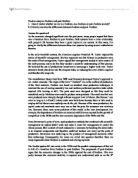So, just what is Post-Fordism? As already eluded to in the start of the essay, it is a period of time, and sociological perspective, but the connotations are much more relevant than those of the Fordist era. Post-Fordism, put simply is beyond-Fordism…so production methods beyond those of the Production Line. So Post-Fordism is itself broken down into ages and eras. The transition was predicted by Antonio Gramsci, an Italian Marxist who observed "Taylor expresses the real purpose of American society -- replacing in the worker the old psycho-physical nexus of qualified professional work, which demanded active participation, intelligence, fantasy, and initiative, with automatic and mechanical attitudes. This is not a new thing, it is rather the most recent, the most intense, the most brutal phase of a long process that began with industrialism itself. This phase will itself be superseded by the creation of a new psycho-physical nexus, both different from its predecessors and superior. As a consequence, a part of the old working class will be eliminated from the world of work, and perhaps from the world.” (Americanismo e Fordismo, 1949). Most academics feel that this transition is well underway, although perhaps not in the form that Gramsci defined or would recognise, in the Flexible Production movement. The differences between Fordism and Post-Fordism are easily broken down into three main sections, Economic, Political and Labour based, for example, during the Fordist period the national market were protected, where-as in a Post-Fordist society there is global competition. There was little ‘on the job’ training in a Fordist workforce, modern/Post-Fordist society dictates that ‘on the job training’ is a pre-requisite for most jobs. On the Political side of matters, during the Fordist period (Not necessarily Ford’s own factories though) there was a strong Trade Union solidarity, more recently there has been a massive decline in Trade Union membership (Education for Economic Survival, 1992 P. 4). So, we can see it is important to view how Fordism and Post-Fordism could and do operate in modern society.
The ages of Post Fordism as predicted by Steinberg are, The information age, Post-Modernity, Global Inter-independence, Mercantilism, Corporate control, Flexible Specialisation, New Social Movements and the Fundamentalist Rejection ages. The information age, will generate wealth, this will be through the exchange of knowledge and information via information technology. The Post-modern age will extend the boundaries of consumerism, invading social and private lives; we can see this in advertising by global capitalist corporations. The Global Inter-independence age ushers in the globalisation of production, with companies depending on other companies to run effectively. This age straddles the globe, blurring national and international boundaries and existing in a contemporary economy. The fourth stage is an age where national coalitions will strive to ‘develop a strategic technological advantage’. Fifth is “a new age of corporate control, in which global corporations and banks will exercise systematic power over markets, firms and states” (Post Fordism, 1994 P. 2). This brings us to the age of Flexible Specialisation, fore-fronting a new take on production, with once again, specialised units and decentralised management methods. It will have an increasingly versatile workforces and developing technology, as a response to the new economy and unpredictable consumer markets. Seventh brings the age of new social movements, serving to humanise the industrial machine, a new capitalism and new social economy (This is very speculative and almost utopian, I am sceptical about this occurring at all, and seeing as capitalism is such a strong force in this day-and-age). Bringing us to the final Fundamentalist Rejectionist era, where societies revert from the technocratic issues in their life, turning instead to pre-enlightenment communitarian models.
The ongoing debate of Post-Fordism is cored in three main, widely accepted hypothesis or approaches to puzzling out the theories. These three consist of ‘The Regulation Approach’, ‘The Flexible Specialisation Approach’ and ‘The Neo-Schumpeterian Approach’. The Regulation approach was pioneered in France and refined by the 1980’s, the aim of the regulationists was to develop a framework to explain the paradox between the apparent instability of Capitalism with its ability to correct and stabilize itself around a set of instructions. The Flexible Specialisation approach lies more in the realm of the American sociologists Charles Sabel, Michael Piore, Jonathan Zeitlin and Paul Hirst. This is specifically a stand alone theory, the designers not wishing it to be linked with other theories. It is an abstract theory to ‘industrial divides’, attempting to “avoid emphasis on the role of general structural tendencies in economic and social life” (Post Fordism, 1994 P. 13). These are both ways of understanding Post-Fordism and elements of such by applying a ‘set of rules’ or a framework to the issues, such as the framework applied to accidents with the Actor Network Theory thesis. The final of the three transitional models is the Neo-Schumpeterian approach which shares similar characteristics with the regulation approach. Although it is not quite as encompassing and rigorous, it is more closely associated with the work on innovation in the 1980’s by Freeman and Perez, based on the work of Joseph A. Schumpeter 1883-1950. It views the “systematic and cyclical nature of capital development” and the ‘Techno-economic paradigm’, building bridges between itself and the regulation approach. The Neo-Schumpeterian view technology as a salient force, thus differing on at least on account from the regulationists.
This issue here is how Post-Fordism is relevant and has an impact on work and society as a whole, allow me first to attempt to define society for you. Society could be described as an extended social group who share a geographical region, a distinctive cultural and economic organization, a sense of common identity and a common culture.







